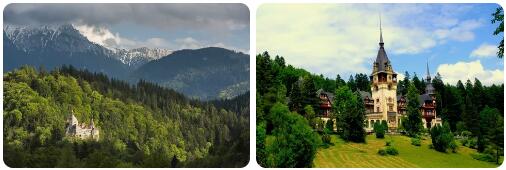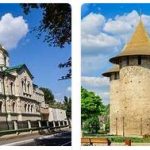Romania: Various travel information
Formalities, visas
An identity card is sufficient for EU citizens. Citizens of the European Union and Switzerland do not need a visa. But there is a visa requirement for residents of over 120 countries.
A list of the countries requiring a visa can be found at the following URL: www.mae.ro/sites/default/files/file/pdf/formulare-consulare/Vize/2011.11.18_viza_anexa1_ro.pdf People who require a visa can obtain one in Germany at the following address.
Visa department of the Embassy of Romania
Dorotheenstr. 62 – 66
10117 Berlin
Tel: +49 – (0) 30 – 8033019/19
Currency
The national currency of Romania is the Leu (plural: Lei)
1 Leu = 100 Bani (1 Ban)
An amount equivalent to more than 10,000 US dollars must be declared to the Romanian customs.
Goods and Customs Regulations
Cheap or country-specific goods and souvenirs
In Romania you can buy beautiful handicrafts such as embroidery, carpets, wood carvings, ceramics and wickerwork. Very valuable souvenirs are so-called reverse glass paintings, which are mostly decorated with religious motifs.
Customs regulations
The import and export of weapons, ammunition or explosives is strictly prohibited. Hunting weapons must be registered and approved. In addition, the import and export of plants and animals that are protected under the Washington Species Protection Act is prohibited. Violation can result in severe penalties. It is also forbidden to bring pornographic material into Romania.
The export of historical, artistic or cultural goods as well as minerals is subject to restrictions, about which one should read carefully.
How to get to Romania
The quickest way to get to Romania is by plane. The airport in Bucharest is particularly cheap.
The country can also be reached by car, bus and train, as well as by ship across the Danube.
Travel in the country
Air connections
There are daily domestic connections between the major cities of Romania.
Railway
The railway network of Romania is approximately 11,275 km long and connects the capital with numerous cities and regions of the country.
Bus
There is a good bus network in the big cities. Overland trips – especially in remote regions – are often difficult.
Roads
The road network is approximately 72,800 km long. In some cases, however, the roads cannot be compared with the Central European standard. As soon as you leave main roads, you end up on gravel roads that are difficult to pass when it rains. There are hardly any highways. Progress is correspondingly slow, for about 300 km you have to reckon with more than 5 hours.
Since there are still many horse-drawn vehicles on the roads in rural areas and these are illuminated at night, driving after dark should be avoided as far as possible. The numerous existing potholes can no longer be seen at night.
Rental
cars Rental cars can be booked in Bucharest and in information offices or large hotels and at the airports. Anyone who takes over a rental car should definitely inspect the spare tire! Because of the poor road conditions, you may have to fall back on this.
Ferry connections
The most important seaport in Romania on the Black Sea is Constanza.
Traffic rules
In Romania, it is well known that traffic is on the right. In order to avoid trouble with the police or even the courts, one should strictly adhere to the traffic rules applicable in the country. The maximum speeds shown can of course be reduced or increased by traffic signs. Regardless of the information given here, it is advisable to obtain detailed information from the ADAC, the AvD or the traffic clubs in the country concerned.
Maximum speeds
In addition to the general speed limits shown, the speed limits indicated by signs must be strictly observed.
- In urban areas: in built-up areas there is a speed limit of 60 km/h for motorists and 40 km/h for motorcyclists.
- Country roads: on country roads there is a speed limit for motorists of 90 km/h, for motorcyclists of 50 km/h.
Special regulations
Since 01/01/2005, a road toll has been levied for trucks over 8 tons (“Rovineta”). Corresponding fees must also be paid for foreign cars, which are based on the respective cubic capacity. These Rovinete are available at Romanian petrol stations near the border.
Blood
alcohol limit In Romania there is a blood alcohol limit of 0 per mille for drivers of motor vehicles. The same rule applies to motorcycle drivers.
Emergency
In case of an accident or other problems with the car or motorbike to reach information and assistance at the following numbers:
Tel.: 021 223 45 25
Mobile: 0040 to 21223 45 25
The ADAC can be reached 24 hours in Munich on the following number:
0049 – (0) 89 – 22 22 22
Warning
Even minor offenses in traffic – such as crossing a white line – can be punished with a limited withdrawal (14 days) of the driver’s license. That leads to a lot of trouble and turmoil. In the worst case, you have to try to get your driver’s license back from Germany with the help of the embassy or the Federal Foreign Office.
International license plate
The international license plate of Romania is:
| RO |
Tourist Office of Romania in Austria
Opernring 1, Stiege R, Stock 4, 404
1090 Vienna
Tel: 0049 – (0) 1 – 317 31 57
E-mail: Rumaenien@aon.at
Web: www.Rumaenien-info.at
Infectious Diseases
The following infectious diseases are particularly likely in Romania:
- Amoebic dysentery
- Bacterial agitation
- Lyme disease, as a result of tick bites
- Cholera, an infection risk only exists for travelers who can come into contact with contaminated water or contaminated food.
- Intestinal infections from contaminated food or water, including amoeba, lamblia, salmonella, shigella and worm infestation, as well as all kinds of viruses and bacteria
- Early summer meningo encephalitis, mainly as a result of tick bites
- Hepatitis A and B
- Polio, polio
- tetanus
- rabies
- Typhoid fever, an infection risk only exists for travelers who come into contact with polluted water or contaminated food.
- Avian influenza virus, the dangerous virus type H5N1 has been found in birds in the country.
Recommended vaccinations
when traveling to Romania are recommended vaccinations against the following diseases:
- Cholera, but only among travelers who may come into contact with polluted water or contaminated food.
- Diphtheria, a vaccination against diphtheria should always exist in your home country.
- Hepatitis A and B
- Polio, polio, vaccination against polio should always exist, also in the home country.
- Meningococcal meningitis
- Tetanus, a vaccination against tetanus should always exist, also in the home country.
- tuberculosis
- Typhoid, but only in travelers who may come into contact with polluted water or contaminated food.
Vaccination requirements There are no vaccination requirements when entering or staying in the country.
Romania: Diplomatic missions
Representations of Romania in Germany
The building of the Romanian embassy is in Dorotheenstrasse in the Berlin-Mitte district. The embassy is not far from the street “Unter den Linden” and from Friedrichstraße train station. It is strongly recommended that you go to the embassy by public transport or a taxi. Parking spaces are very difficult to find in the vicinity of the embassy.
Embassy of Romania
Dorotheenstr. 62 – 66
10117 Berlin
Tel: 0049 – (0) 30 – 21 23 92 02
E-Mail: office@rumaenische-botschaft.de
Consulate General in Bonn Legionsweg
14
53117 Bonn
Tel: 0049 – (0) 228 – 6 83 81 11
Consulate General in Munich
Richard-Strauss-Straße 149
81679 Munich
Tel: 0049 – (0) 89 – 55 33 07
Honorary Consulate General in Bad Kreuznach
55543 Bad Kreuznach
Mannheimer Straße 230
Tel: 0049 – (0) 671 – 8 96 01 07
German representations in Romania
Embassy in Bucharest
Strada Av. Cpt. Gheorghe Demetriade 6 – 8
011849 Bucharest
Tel: 0040 – (0) 21 – 202 98 30
E-Mail: info@bukarest.diplo.de
Web: www.bukarest.diplo.de
Consulate General in Sibiu
Strada Lucian Blaga 15-17
550169 Sibiu (Hermannstadt)
Tel: 0040 – (0) 269 – 20 62 11
E-Mail: Info@hermannstadt.diplo.de
Web: www.hermannstadt.diplo.de
Consulate in Timisoara
Splaiul Tudor Vladimirescu nr.10
Timisoara
Tel: 0040 – (0) 256 – 30 98 00
E-Mail: info@temeswar.diplo.de
Web: www.timisoara.diplo.de
Austrian representations in Romania
Embassy in Bucharest
Dumbrava Rosie 7
020461 Bucharest
Tel: 0040 – (0) 21 – 201 56 12/-15/-18
E-Mail: bukarest-ob@bmeia.gv.at
Web: www.aussenministerium.at/bukarest
Honorary Consulate in Timisoara
Str. Marasesti No. 7, Ap. 2
300077 Timisoara
Tel: 0040 – (0) 256 – 29 43 00
E-Mail: consaustria@mail.dnttm.ro
Representations of Romania in Austria
Embassy in Vienna
Prinz-Eugen-Strasse 60
1040 Vienna
Tel: 0043 – (0) 1 – 505 32 27
E-Mail: ambromviena@ambrom.at
Web: http://viena.mae.ro
Honorary Consulate in Salzburg
Gaisbergstrasse 20
5020 Salzburg
Tel: 0043 – (0) 662 – 64 36 55
E-Mail: konsulat.romania@utanet.at
Honorary Consulate in Linz
Poschacherstraße 35
4020 Linz
Tel: 0043 – (0) 732 – 662 33
E-Mail: w.berger-vogel@bbag.com
Honorary Consulate in Vienna
Schottenring 17
1010 Vienna
Tel: 0043 – (0) 1 – 315 68 01
Honorary Consulate in Graz
Maria Trosterstrasse 211
8044 Graz
Tel: 0043 – (0) 316 – 392 156
E-Mail: konsulat.romania@bardeau.ro
Honorary Consulate in Eisenstadt
Rusterstraße 12-16
7000 Eisenstadt
Tel: 0043 – (0) 676 – 39 26 745
Swiss representations in Romania
Embassy in Bucharest, Str.Grigore
Alexandrescu 16-20
010626 Bucharest
Tel: 0040 – (0) 21 – 206 16 00
Email: buc.vertretung@eda.admin.ch
Web: www.eda.admin.ch/bucarest
Representations of Romania in Switzerland
Embassy in Bern
Kirchenfeldstrasse 78
3005 Bern
Tel: 0041 – (0) 31 – 352 35 22
Email: ambasada@roamb.ch
Consulate in Lugana
Riva Paradiso 42
6900 Lugano
Tel: 0041 – (0) 91 – 994 93 92
Fax: 0041 – (0) 91 – 994 93 35
Email: consorom@bluewin.ch
Consulate General in Oetwil am See
Industriestrasse 10
8618 Oetwil am See
Tel: 0041 – (0) 44 – 929 65 42
Email: dzc@deesse.ch








